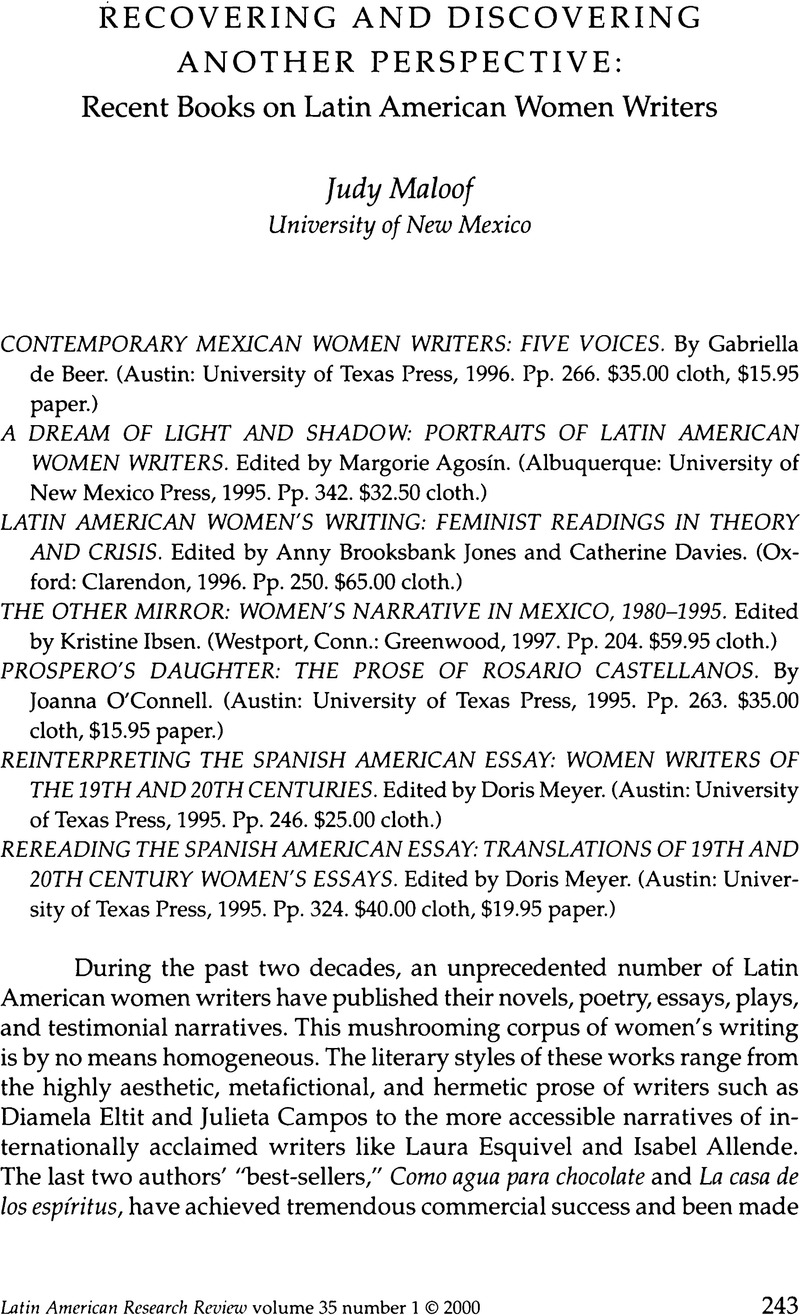No CrossRef data available.
Published online by Cambridge University Press: 05 October 2022

1. This testimony recounts the gross injustice and exploitation of Mayan peasants and the brutal savagery of the military during the 1980s. In direct language, she recounts how her brother, father, and mother were all killed in separate horrifying incidents, and she also describes many of the customs, rituals, and beliefs of her indigenous community. This book has stirred heated debates about revision of the humanities curriculum at Stanford University and is often cited in the ongoing “culture war” controversy within academic ciricles about curriculum reform and multiculturalism. The recent publication of Robert Stoll's Rigoberta Menchú and the Story of All Poor Guatemalens has sparked more debates regarding history and literature, fact and fiction in Rigoberta's testimonial.
2. Jean Franco, “Going Public: Reinhabiting the Private,” in On Edge: The Crisis of Contemporary Latin American Culture, edited by George Yúdice, Jean Franco, and Juan Flores (Minneapolis: University of Minnesota Press, 1992), 73.
3. In addition to the seven books reviewed in this essay, some of the most significant contributions published during the 1990s are Margorie Agosín, Mujer, imagen, escritura (Santiago, Chile: Cuarto Propio, 1993); Knives and Angels: Women Writers in Latin America, edited by Susan Bassnett (London: Zed Books, 1990); Debra Castillo, Talking Back: Toward a Latin American Feminist Literary Criticism (Ithaca, N.Y.: Cornell University Press, 1992); Jean Franco, Las conspiradoras: La representación de la mujer en México (Mexico City: Fondo de Cultura Económica, 1994); Kay García, Broken Bars: New Perspectives from Mexican Women Writers (Albuquerque: University of New Mexico Press, 1994); Magdalena García Pinto, Women Writers of Latin America: Intimate Histories (Austin: University of Texas Press, 1991); Splintering Darkness: Latin American Women Writers in Search of Themselves, edited by Lucía Guerra-Cunningham (Pittsburgh, Pa.: Latin American Literary Review Press, 1990); Amy Kaminsky, Reading the Body Politic: Feminist Criticism and Latin American Women Writers (Minneapolis: University of Minnesota Press, 1992); Spanish American Women Writers: A Bio-Bibliographical Source Book, edited by Diane E. Marting (Westport, Conn.: Greenwood, 1990); Ileana Rodríguez, House/Garden/Nation: Space, Gender, and Ethnicity in Post-Colonial Latin American Literature by Women (Durham, N.C.: Duke University Press, 1994); Claudia Schaefer, Textured Lives: Women, Art, and Representation in Modern Mexico (Tucson: University of Arizona Press, 1992); Cynthia Steele, Politics, Gender, and the Mexican Novel, 1968–1988: Beyond the Pyramid (Austin: University of Texas Press, 1992); and In the Feminine Mode: Essays on Hispanic Women Writers, edited by Noel Valis and Carol Maier (Lewisburg, Pa.: Bucknell University Press, 1990).
4. In light of the 1994 Zapatista uprising and ongoing “low-intensity war” against the indigenous communities of Chiapas, O'Connell's discussion of the history of indigenismo and ethnic conflict in Mexico remains relevant.